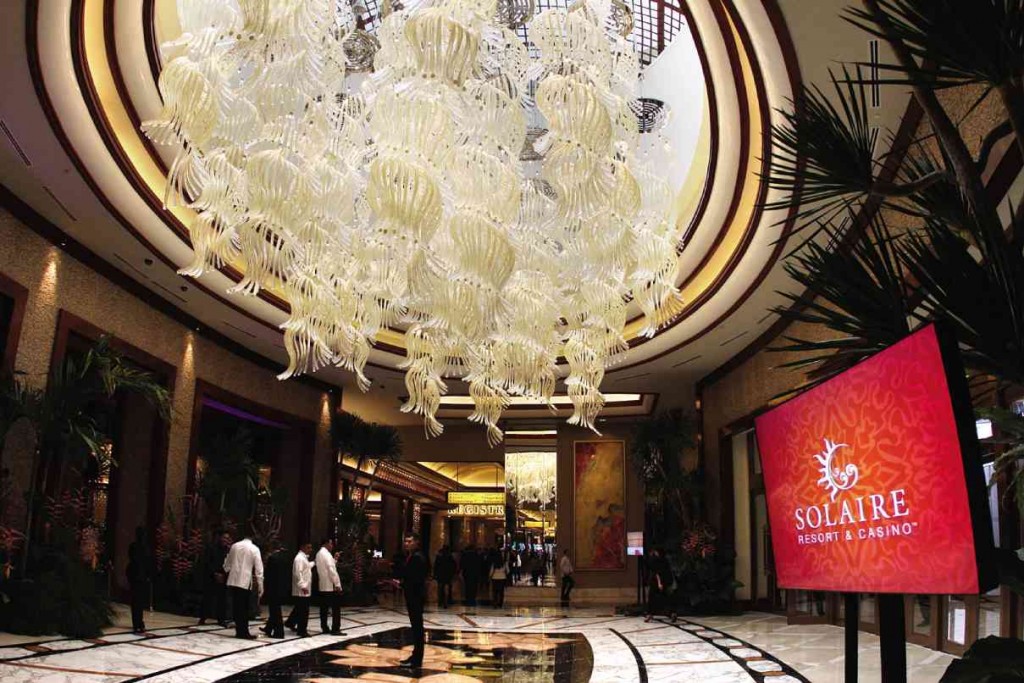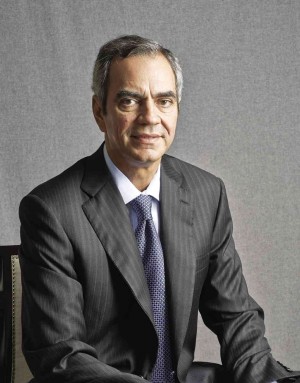Razon ready to double down on gaming
LESS than a decade ago, Enrique K. Razon Jr. plunked in $1.2 billion to build the Philippines’ largest casino resort venture—a business where he had no previous experience—and not a few people thought he was playing with his chips recklessly, so to speak.
Today, his Solaire Casino and Resort gaming and entertainment complex is still not in the clear, but more and more signs are emerging that the massive gamble made by the ports tycoon, one of the country’s richest men, is paying off.
More importantly, it seems that not even the corruption crackdown in mainland China, which has resulted in thousands of vacant gaming tables in casinos across Asia, has curbed his enthusiasm for risk-taking in this already risky business.
“People have such a misconception of the problem with the Chinese gaming market,” Razon told the Inquirer in an interview. “Our relationship with China soured in 2011, so we never started off with China gamers because they could not come here. Some of them had visa issues.”
So from the outset, Bloomberry Resorts Corp., the publicly listed holding company for his gaming and leisure business, tapped markets other than the Chinese gamblers sought after by other gaming centers like Macau, Singapore and Korea.
“We focused on other high rollers,” Razon said. “We had Chinese coming from Macau, Hong Kong, and we developed a good market in Taiwan. We have a very good market in Malaysia, and then other countries followed.”
For this high margin market, Razon has his company’s private jets fly in high rollers and they are brought from the airport to his nearby hotel either by helicopter or a well-appointed Bentley limousine.
At the same time, however, the mass market segment of Solaire was also growing at a rapid clip, despite early hiccups encountered with the hotel and casino resort’s expatriate management team when it opened in early 2013.
“In the mass gaming segment, half of our revenue now comes from Koreans in the so-called ‘local market’—local Koreans or people coming from Korea but playing as mass gamers,” he said. “And recently, because of the crackdown last year in Macau, we started getting China players, little by little. That’s been growing steadily. Some moved to us, especially those who really like gaming and can’t go to Macau. We also get some from Singapore.”
So instead of mimicking the experience of other casinos in the region, which started with a high base of Chinese players that had steadily decreased in number over the last two years, Solaire started with few mainland players and is now seeing an uptrend, albeit on a more gradual scale.
But even if high-spending Chinese players never return to the gaming tables, the man who owns the pioneer locator in the Pagcor Entertainment City development that sits on reclaimed land along Manila Bay said his business—along with the rest of the local casino industry—will continue to grow.
“Absolutely, we will grow,” he said. “Gaming in the Philippines has been growing. Even the mass market has been growing.”
Razon added that the recent entry of his gaming competitors—like the City of Dreams of the SM group-backed Premium Leisure Corp.—created additional interest among potential clients which eventually translated to growth for the entire industry.
At the same time, Bloomberry’s financial performance has also been improving steadily. It has capped the red ink in the third quarter of 2015 to P189.5 million, coming from losses of more than P1 billion in the first quarter of its opening year.
Razon said he was not worried because these numbers reflected expenses incurred while building Solaire’s infrastructure and not because of weak gaming numbers.
“Our quarterly performance doesn’t really reflect the top line. It’s the bottomline,” he said. “We’re ramping up Phase 1-A [of Solaire], and that means additional costs. Now we have to generate the revenues to cover all those costs, and the growth is providing that. So the problem is not the top line, it’s the bottom line. But slowly, [the losses] are narrowing, quarter on quarter.”
At the same time, the man ranked by Forbes magazine as one of the country’s wealthiest, with a net worth of about $3.7 billion, gave a more nuanced view on the strategy that all local and foreign casino operators are adopting in response to the China situation—that of de-emphasizing gaming and developing other revenue streams in the leisure space like entertainment, dining and retail.
“The bulk of the revenues will still be from gaming,” Razon said. “But once the gaming market matures, more investments and more developments will go into the nongaming aspects. Here we are a little different from Macau. In that sense, we’re more like Las Vegas where nongaming is becoming a big attraction.”
“But those things have to be paid for by revenues from gaming,” he emphasized.
Having already outspent his competitors, is the tycoon willing to invest more in a venture that is promising but has so far not showed black ink on its financial reports?
“We will spend more at the right time,” Razon said, but declined to give a timeframe or on how much more he is willing to bet on the table. “We still have land for expansion. Once we’re fully efficient here and have maximized the existing facility, we will go into Phase 2.”
“Phase 2 will be a big project but [it will happen] when the market size warrants it,” he said. “So we really don’t know how much that will be. The market has to tell us what it wants and what it’s looking for.”
But the man who also owns the country’s largest container port knows that the growth of Solaire and the rest of Pagcor Entertainment City will be capped unless other elements of the tourism and leisure business come into play, specifically improvements in the country’s creaking infrastructure system.
And for that, Razon is looking to the country’s next President.
“If the next President ends up doing a really good job, it will be because he or she will build transformational infrastructure,” he said. “I want a leader who will focus on catching up in [terms of] badly needed infrastructure that we lack.”
“We also need a new airport,” he said. “All our neighbors have built their airports—Hong Kong, Kuala Lumpur, Thailand … you name it. We need to do the same if we really want to boost the country.”
To solve the massive traffic gridlock that paralyzes Metro Manila’s road network everyday, Razon urged the government to build a subway system that would decongest the city, saying “we need an integrated subway system. It’s a worthwhile investment even if it costs $20 billion to $25 billion.”
Asked whether he felt that such a massive financial undertaking could be justified, the tycoon replied: “It’s not expensive. It’s an investment in our country. How can that be called expensive? As long as it’s not done in a corrupt way, it’s not going to be expensive.”
Then he added: “What is expensive is what’s happening today. The traffic and all these problems. So we’re not getting the investments we need. That’s expensive— opportunity cost and opportunities lost.”
















